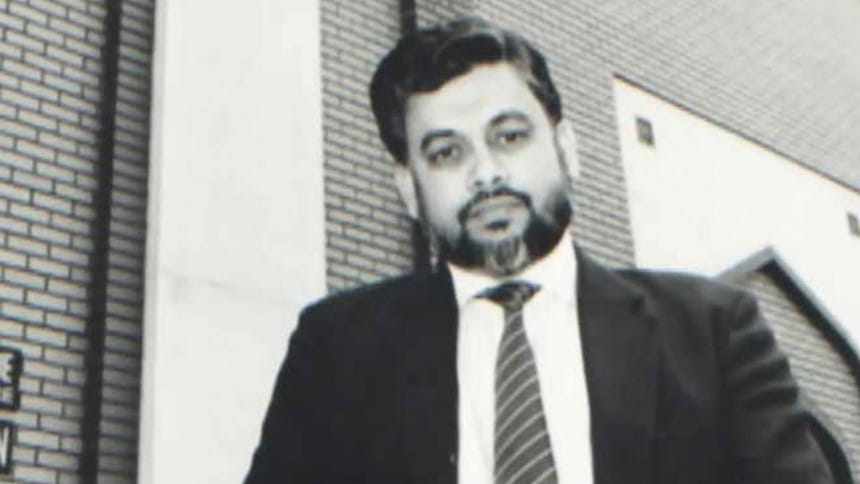How long will the UK harbour a mass murderer?

How does a country come to terms with a blot in its history as dark as the mass murder of intellectuals during the liberation struggle of Bangladesh? No matter how fierce or intense a war is, how does anyone, anywhere, even begin to explain the level of cruelty that motivates one to knock on the doors of academics, journalists, writers and doctors—not soldiers or even politicians, but civilians who make up the moral backbone of a revolution and shape the hopes of a new nation—only to slaughter them in cold blood as the last act of cowardice before conceding defeat?
Perhaps the most suitable words to describe the war crimes committed at Rayer Bazaar on December 14, 1971, were used when the chairman of the International Crimes Tribunal-2 read out the punishment for war criminals Chowdhury Mueen Uddin and Ashrafuzzaman Khan for their complicity in the killing of martyred journalist and poet Selina Parveen. The brutal death by bayonet charge of Selina Parveen, who in her last moments begged for her life for the sake of her child, were described as "an impious butchery…a sacrilegious act…(and) a shame for human civilisation". Both these men were also charged and convicted for the torture and killing of 17 other intellectuals, including the playwright professor Munier Chowdhury, novelist and journalist Shahidullah Kaiser, and professor of Cardiology Mohammed Fazle Rabbee.
Yet, halfway across the world in the UK, the leader of the infamous Al-Badr and convicted war criminal Mueen Uddin, confidently claimed that the charges against him were completely false. Despite the testimony of the widow of eminent scholar professor Mufazzal Haider Chaudhury, who saw Mueen Uddin lead her husband away to his death; despite the testimony of the widow of journalist Sirajuddin Hussain, who saw a similar sight; despite testimonies from Mueen Uddin's colleagues at Daily Purbodesh of his intimate knowledge of the detention centres and his handing over of information to Pakistani officers in 1971; and despite hundreds of pages of harrowing testimonies that acted as evidence during the war crimes trials in Bangladesh—Mueen Uddin was able to casually dismiss decades of pain and denial of justice from the safety of his one million pound home in London.
How ironic that the country that has sheltered him since 1972, that allowed him to become a British citizen and even take up a role in its National Health Service as a director of Muslim Spiritual Care Provision, knowing full well the crimes he had committed—as early as January 1972, the New York Times identified him "as the head of a secret, commando—like organisation of fanatic Moslems that murdered several hundred prominent Bengali professors, doctors, lawyers and journalists in a Dacca brickyard"—is now facing a libel lawsuit for their efforts. Mueen Uddin is suing British Home Secretary Priti Patel for 60,000 pounds after she shared a report on Twitter linking him to war crimes during Bangladesh's Liberation War in 1971, according to the Daily Mail. The fact that a right-wing tabloid like the Daily Mail has taken up this story most enthusiastically is telling—historically, their tone has been decidedly anti-immigrant and anti-Muslim, and cases like these only add fire to the fodder while completely overlooking Britain's complicity in the matter.
Why is a man like Mueen Uddin still living an easy breezy life of luxury in the UK, when ordinary Bangladeshi immigrants live with the threat of deportation hanging over their heads due to the "hostile environment" created by the British Home Office? The death of Paulette Wilson on July 23, who was nearly deported after 50 years of living in the UK, has renewed focus on the 2018 Windrush scandal, where a huge number of British citizens of Caribbean origin were wrongfully detained and threatened with deportation. Even in February this year, a young father who has lived in the UK since he was 12 years old was deported to Jamaica—it seems a two year conviction for non-violent burglary offences is enough to get you kicked out, but war crimes committed in your youth will be received with a blind eye and turning of the cheek.
So far, Bangladesh has not been able to negotiate an extradition treaty with the UK. The oft-repeated excuse for this is Article 3 of the European Convention of Human Rights (ECHR), which stipulates that if a person "faces a real risk of being subjected to torture or to inhuman or degrading treatment or punishment in the requesting country", he cannot be extradited. Given that Mueen Uddin has already been handed the death penalty by the International Crimes Tribunal, the UK cannot hand him over to us on moral grounds. As is often the case with our capricious (ex) colonisers, this strong moral compass seems to have disappeared in the case of Shamima Begum—after being groomed by extremists as a teenager, becoming an "ISIS bride" and losing her baby to pneumonia in the Syrian refugee camps, the UK has still revoked her British citizenship and has only recently allowed her permission to enter the country to fight for it.
What is really alarming is the level of influence that the UK has allowed a war criminal like Mueen Uddin to wield, while at the same time bullying others with far lesser crimes than his. In 2010, Channel 4 Dispatches investigated the extremist ideologies of the Islamic Forum of Europe (IFE)—of which Mueen Uddin is the founder—and how it was spreading across East London from East London Mosque with the ultimate aim of creating an Islamic state with sharia law in Europe. Despite these revelations and the subsequent expulsion of Tower Hamlets' mayor Lutfur Rahman from the Labour Party—he was later found guilty of electoral fraud and corruption—Mueen Uddin was allowed to continue to work with Muslim Aid (he still remains a trustee) and be closely involved with the Muslim Council of Britain. Through these actions, Mueen Uddin has managed to become a self-styled "British Muslim leader" and use his influence and lobby to challenge the accusations against him—in 2009, The Guardian was forced to print an apology for publishing allegations of involvement in genocide against him because he "has never been prosecuted, charged nor even arrested in connection with these events".
It is high time for the British government to stop looking the other way when it comes to Chowdhury Mueen Uddin. It is in their interests to stem the extremist ideologies coming from British-Bangladeshi "Muslim leaders" like Mueen Uddin and in the wake of Brexit, it is even more in their interest to build relations with Commonwealth countries like Bangladesh. On our end, we must pursue the establishment of an extradition treaty with the UK with renewed political will. If nothing else, the UK must apply the principle of universal jurisdiction (like they did with Pinochet), which allows states to claim criminal jurisdiction over an accused person regardless of where the alleged crime was committed, and arrange for trials themselves. We have already waited 49 years for justice.
Shuprova Tasneem is a member of the editorial team at The Daily Star.
Her Twitter handle is @ShuprovaTasneem

 For all latest news, follow The Daily Star's Google News channel.
For all latest news, follow The Daily Star's Google News channel. 



Comments